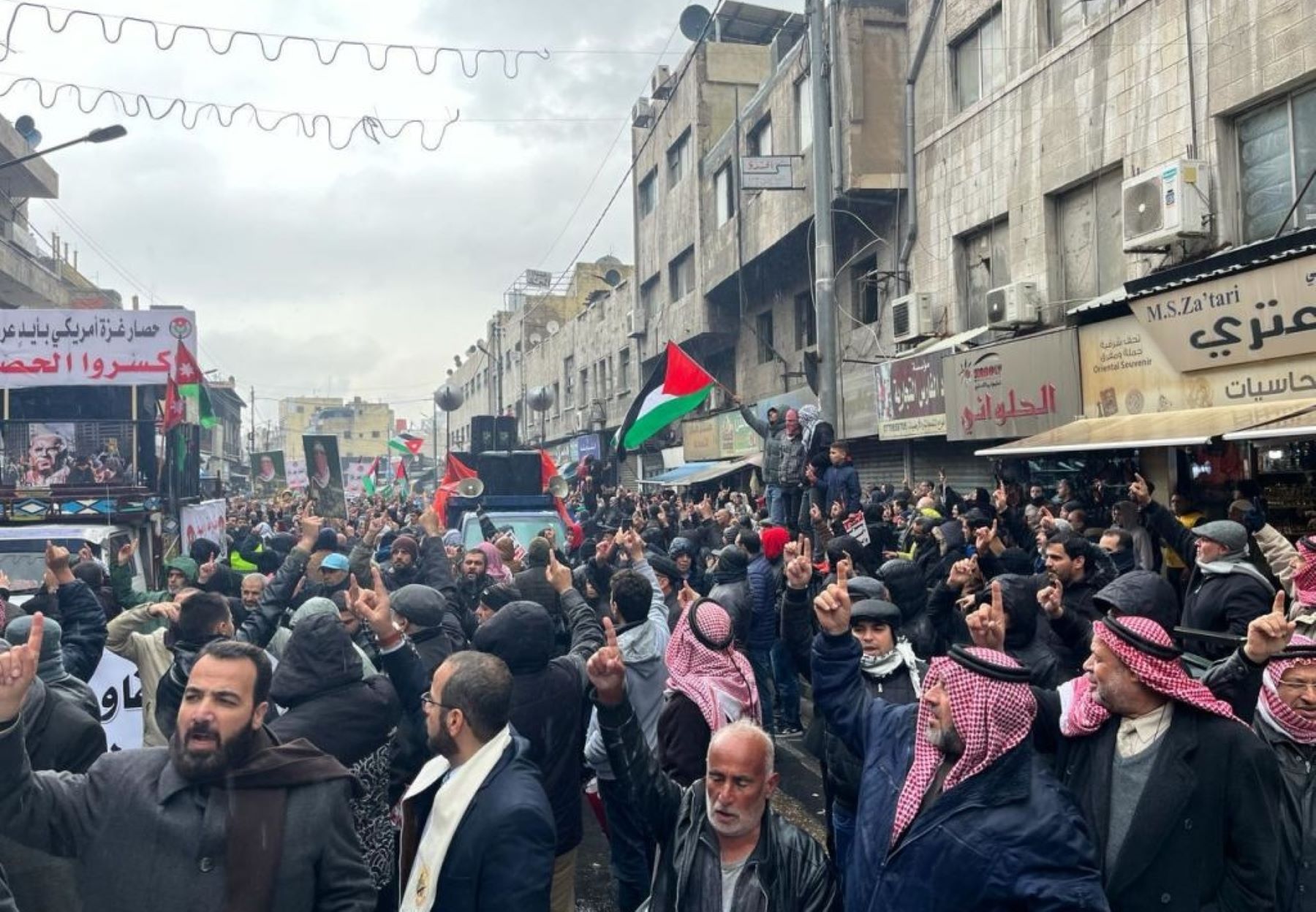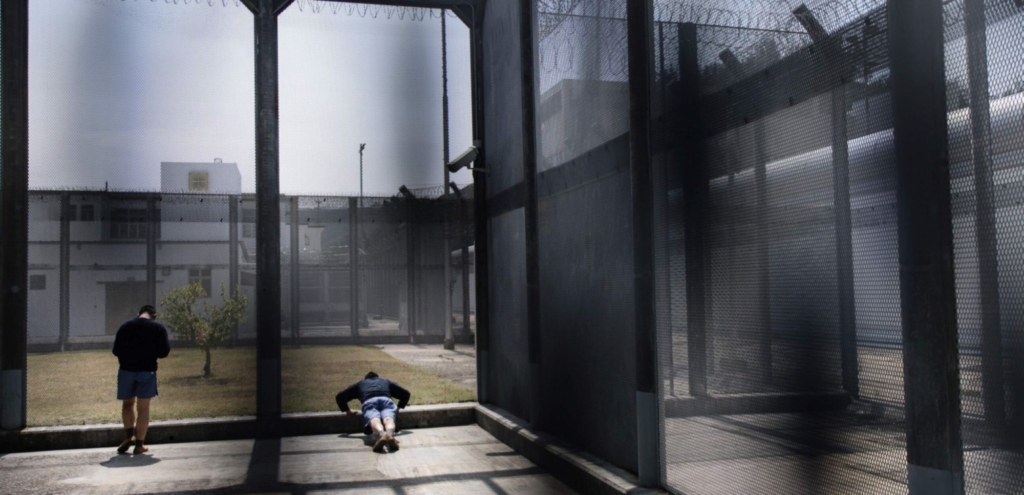The Jordanian authorities must end a sweeping crackdown that has seen hundreds of people arrested by security and intelligence forces since October 2023 for expressing their support for rights of Palestinians in Gaza or criticizing the government’s policies towards Israel, said Amnesty International.
At least 1,000 people – protesters and bystanders – were arrested during protests in support of Gaza in the Jordanian capital Amman within a one-month period between October and November 2023. At least five others were arrested between November and December 2023 and charged under the August 2023 Cybercrimes Law for social media posts expressing pro-Palestinian sentiments, criticizing the authorities’ peace or economic deals with Israel or calling for public strikes and protests.
“No one should face arrest or prosecution simply for expressing their opinions about the war in Gaza or criticizing their government’s policies. The Jordanian authorities have launched a crackdown, using repressive legislation such as the Cybercrimes law, to eradicate all vestiges of freedom and dissent. They are shamefully levying vague charges against individuals who are solely exercising their legitimate rights to freedom of expression and assembly,” said Diana Semaan, Amnesty International’s Jordan researcher.
“The Jordanian authorities must immediately release and drop charges brought against all those arbitrarily detained and/or prosecuted solely for exercising their rights to freedom of expression and peaceful assembly. They must also amend the Cybercrimes Law of 2023 to meet international standards.”
Jordan’s Cybercrimes Law uses imprecise, vague and undefined terminology, criminalizes any speech that may offend law enforcement officials, and weakens online anonymity.
No one should face arrest or prosecution simply for expressing their opinions about the war in Gaza or criticizing their government’s policies.
Diana Semaan, Amnesty International
Amnesty International has documented the cases of six political activists, five of whom have been charged under the Cybercrimes Law. The organization interviewed three lawyers and others with knowledge of the cases and reviewed charge sheets and other court documents where available as well as the defendants’ social media posts.
Amnesty International also interviewed two lawyers representing protesters and other individuals arrested in the vicinity of protests. Most were charged with offences relating solely to the exercise of their right to freedom of peaceful assembly. Several of those released by the court pending trial were re-arrested, subjected to administrative detention and forced by the local Governor to pledge to no longer take part in protests as a condition of release.
The organization’s Crisis Evidence Lab also verified videos showing the arrest of individuals and reviewed statements by the media and Jordanian authorities about the ongoing crackdown.
Prosecuted for pro-Palestinian social media posts
Three lawyers told Amnesty International that since November 2023, Jordanian security forces have arrested at least six political activists for social media posts expressing pro-Palestinian sentiments or criticizing the authorities’ policies towards Israel and advocating for public strikes and protests.
In December 2023, the public prosecutor summoned Ayman Sanduka, political activist and mathematics professor, for questioning in connection with his social media call for a general strike. According to his lawyer, Ayman Sanduka had also published a letter addressed to the King in October in which he criticized Jordan’s diplomatic relations with Israel. He was held for a month for investigation and then released pending trial. On 24 January 2024, he was sentenced to three months in prison on charges of “defaming an official body,” but he has appealed that verdict.
While Ayman Sanduka was held for investigation, the State Security Court prosecutor summoned him and pressed charges under the Penal Code and Cybercrimes Law. The State Security Court is a military court that fails to meet international standards of impartiality and independence and is often used to prosecute civilians in violation of international law. Ayman Sanduka is currently detained by State Security pending trial.
A demonstrator who was arrested during pro-Palestinian protests in December 2023 for chanting anti-government slogans told Amnesty International that the prosecutor charged him under the Cybercrimes Law after the chants were shared widely online. He was held for four days before being released. His trial is ongoing at a civilian court in Amman.
Amnesty International reviewed court documents pertaining to three other cases of individuals tried in civilian courts for their social media posts. The documents listed charges including “inciting sedition, strife, and hatred”, “sending, re-sending, or publishing libelous or slanderous information”, “defaming an official body” and “publishing pictures, information, or news of law enforcement officials” under the Cybercrimes Law. One of them was released in January 2024 after serving his three-month sentence. The other two are still in prison serving their three-month jail sentence handed in January 2024.
Released only after pledging to stop protesting
Two lawyers told Amnesty International that authorities continued to arrest people participating in pro-Palestinians protests in Amman, but that the number of arrests has decreased since the beginning of December 2023. Between 17 October 2023 and 16 November 2023, the authorities arrested more than 1,000 individuals, including bystanders, during protests in support of Gaza, the lawyers said. Out of these, 700 individuals were referred to the Amman court under charges related to the penal code, such as “committing acts of violence”, “inciting discord” and “damaging public property”. Most of these individuals were subsequently released on bail pending trial. The Amman court acquitted the remaining 300 individuals.
Local governors have also used the Crime Prevention Law of 1954 to administratively detain some of those accused, holding them without charge or trial and only releasing them on bail after they signed a document pledging to stop participating in protests. Jordanian law fails to provide those administratively detained with an opportunity to challenge their detention.
Under international law and standards, the authorities may not require “pledges” from individuals not to organize or participate “in future assemblies”. Amnesty International calls on the Jordanian authorities to repeal the Crime Prevention Law and ensure that anyone in administrative detention is either released or charged with a recognizable offence, in accordance with international standards.
Denied access to lawyers
A lawyer told Amnesty International that she and other lawyers represented over a dozen clients who had been arbitrarily detained by intelligence forces in connection with pro-Palestine protests and held for at least a month without access to their family or lawyer before being either released without charge or referred to the State Security Court. She cited the case of a medical student who (among many others) was detained for 95 days after protesting:
“I was allowed to see him once when he signed power of attorney and that was it… I have seven other cases [of individuals] who have been held by the intelligence forces for the same reasons for up to three months without any due process, including visits.”
Protestors detained at the State Security Court faced charges relating to “undermining the political regime” under the Penal Code. The authorities should immediately drop charges against civilians facing trial at the State Security Court solely for exercising their rights to freedom of expression and peaceful assembly.
The authorities also have prohibited protests close to areas bordering the Palestinian territories claiming they pose a threat to national security. On 11 November 2023, security forces pre-emptively arrested around 25 individuals who were planning a sit-in near the border on security grounds. They were all released on 23 November 2023 without charge.
Background
The recent crackdown is part of a demonstrable pattern of Jordan’s crackdown on the rights to freedom of assembly and expression through the use of repressive laws. In a visit to Jordan in September 2023, Amnesty International documented how the authorities prosecuted nine activists, journalists and others for criticizing the authorities’ conduct and policies, organizing discussions on issues deemed “sensitive” by the authorities, and calling for anti-government protests. In 2023, the authorities, including security forces and civilian and military courts, investigated or prosecuted at least 43 individuals for online expression using abusive and vague laws such as the Cybercrimes Law of 2015, Anti-Terrorism Law and Penal Code.
What else can I do to help?
For more ways to take action and further information on the current crisis and Amnesty’s work on Israel and the Occupied Palestinian Territories, check out the action toolkit on our country page.
Top image: People gather to stage a demonstration in support of Palestinians those who under attacks of Israel and demanding the blockade on Gaza to be lifted in Amman, Jordan on January 26, 2024. Photo by Laith Al-jnaidi/Anadolu via Getty Images.





















